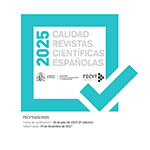Unlivably Accelerated Work: How Neoliberal Capitalist Temporalities Produce Labour Precarity
Résumé
This paper argues that, despite a few positive developments in recent decades, the global labour landscape is still notoriously marked by forms of precarity, unlivability and exploitation. Thus, while acknowledging that contemporary experiences of work are complex and diverse, it emphasises the detrimental impact that the neoliberal production of precarity and the phenomenon of social acceleration are having on them all. In this sense, it contends that temporal pressure and the control of workers’ time is a nodal point from which various forms of labour precarity derive. With a theoretical framework based on the works of Rancière, Butler and Rosa among others, this paper seeks to illuminate the relationship between the accelerated temporalities of neoliberal capitalism and emerging forms of labour precarity. It does so, first, by characterising contemporary time regimes and identifying the productivist rationality that underpins them. It then analyses the manner in which productivism effectively materialises in workplace surveillance, automation and logistical technologies. Finally, it presents two compelling examples that illustrate how neoliberal capitalist time regimes, their productivist normative code, and their association with the latest technology not only perpetuate disciplinary mechanisms of old, but also enable new overlappings between various forms of labour precarity and socially assigned disposability.
Téléchargements
##submission.format##
Licence
La revista Las Torres de Lucca. International Journal of Political Philosophy, para fomentar el intercambio global del conocimiento, facilita el acceso sin restricciones a sus contenidos desde el momento de su publicación en la presente edición electrónica, y por eso es una revista de acceso abierto. Los originales publicados en esta revista son propiedad de la Universidad Complutense de Madrid y es obligatorio citar su procedencia en cualquier reproducción total o parcial. Todos los contenidos se distribuyen bajo una licencia de uso y distribución Creative Commons Reconocimiento 4.0 (CC BY 4.0). Esta circunstancia ha de hacerse constar expresamente de esta forma cuando sea necesario. Puede consultar la versión informativa y el texto legal de la licencia.







